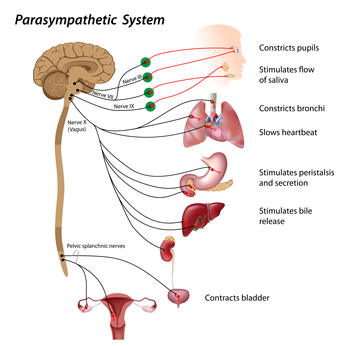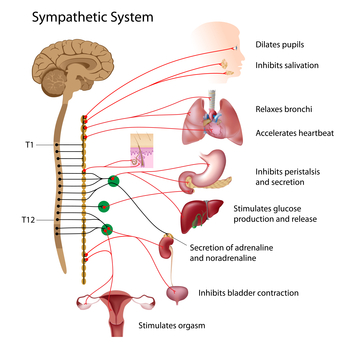Autonomic Neuropathy – The Most Commonly Underdiagnosed Condition
What is the autonomic nervous system and what is autonomic neuropathy?
The nervous system is the communication system between the brain and the rest of the body. The autonomic nervous system contains the nerves that regulate the functioning of the internal organs. It is part of the peripheral nervous system (meaning outside the brain and spinal cord).
The autonomic nervous system has two parts – the sympathetic system and the parasympathetic system.


The sympathetic part of the autonomic nervous system regulates the flight-or-fight responses. It also performs such tasks as relaxing the bladder, speeding up heart rate and dilating eye pupils.
The parasympathetic part of the autonomic nervous system helps maintain normal body functions and conserves physical resources. This division also performs such tasks as controlling the bladder, slowing down heart rate and constricting eye pupils.
See the diagrams for more information about what each of them does.
What is autonomic neuropathy?
Have you ever wondered why you may be experiencing symptoms like sleep apnea, abdominal pain, or hypertension? There’s a hidden health condition that could be at the root of these mysterious problems—Autonomic Neuropathy. It’s a condition that disrupts the function of the autonomic nervous system, which controls bodily functions such as heart rate, digestion, and temperature regulation.
The tricky part is that symptoms can vary widely and often go unrecognized, leading to a delay in diagnosis and treatment.
Autonomic neuropathy is nerve damage to an autonomic nerve or nerves. This damage interrupts signals between the brain and the internal organs. This can cause problems with the functioning of one or more of these organs and their function.
The degree and type of problem create varies. In some people, the problem may be subclinical (you don’t notice it). In other people, symptoms may be disabling.
This nerve damage can continue to get worse if the cause is not found and corrected.
They symptoms of autonomic neuropathy vary depending on the cause, and on which nerves are affected.
What are some of the conditions that this type of neuropathy can create?
Heart
Autonomic neuropathy interferes with the nerve impulses that regulate blood pressure and heart rate. Due to this, blood pressure may drop sharply after sitting or standing causing dizziness or fainting.
A person may also not be able to feel angina (chest pain) which is a warning sign of heart disease.
It can cause abnormal heart rate or rhythm, or high blood pressure.
Lungs
It can cause shortness of breath with activity or exercise.
Eyes
It can cause the pupils not to dilate, or sluggish pupil reaction. This makes it difficult to adjust from light to dark and causing problems with driving at night.
Digestive System
It can cause problems with the stomach and intestines and thus with digestion.
It can cause swallowing problems.
It can cause the stomach to empty too slowly. It can give the feeling of being full after only a few bites and can cause vomiting of undigested foods.
It can cause the blood sugar levels to fluctuate.
It can cause a swollen abdomen.
When the bowels are affected, it can cause either constipation or diarrhea and can cause problems controlling bowel movements.
Urinary tract
Nerve damage can prevent the bladder from emptying completely. When this happens bacteria can grow more easily resulting in infection.
It can cause urinary incontinence. A person might not know when the bladder is full. It can cause difficulty when trying to urinate and can cause leaking urine.
Sexual Response
Nerve damage can result in gradual loss of sexual response in both men and women.
It can also result in erectile dysfunction in men and vaginal dryness in women.
Skin Dryness and Sweating
Nerve damage of the nerves to the skin can affect the activity of the sweat glands. This can make it difficult for the body to regulate the body temperature by producing adequate perspiration. It can create heat intolerance.
It can also create profuse sweating at night or while eating. I
It can cause changes in the skin texture, moisture and oiliness of the skin. It can result in dryness, thickening and cracking of the skin.
Some of the symptoms of Autonomic Neuropathy include:
- Urinary retention
- Hypertension
- Abdominal pain (ache)
- Malabsorption
- Gastroparesis
- Constipation
- Sleep Apnea
- Abnormal Sweating
- Orthostatic hypotension (dizziness or lightheadedness and possibly fainting)
- Arrhythmia
What causes autonomic neuropathy?
Neuropathy is nerve damage, and anything that can cause nerve damage can cause autonomic neuropathy. It all depends on which nerve is damaged. Most often autonomic neuropathy happens along with another neuropathy, but sometimes autonomic nerve damage can occur by itself without other nerve involvement.
However, the main cause is Diabetes or Pre-Diabetes (Insulin Resistance). Pre-Diabetes is often not realized until it is too late.
The many causes of neuropathy are listed here: What are the Factors that Cause Nerve Damage
What can you do about Nerve Damage?
No matter what the cause or what nerve is affected, Neuropathy is basically the same – the nerve has been damaged.
Read: Neuropathy for more information.
RELIEF? *
What can be done for relief?
Take a Quiz: Am I doing everything I can to daily help my neuropathy?
Find out what lifestyle changes will help, take the quiz and get our suggestions and get our assistance on what you can do.
The main thing that the body needs is B1 and Alpha Lipoic Acid. B1 is water soluble and can wash out of the body too quickly to be used. Thus, there is Benfotiamine which is fat soluble, and the body can hold onto it and utilize it.
A formula that has both Benfotiamine & Alpha Lipoic Acid (as well as the other vitamins that are needed for nerve health can fe found here
Nerve Support with Benfortiamine
*Studies & Research on Nerve Health
STILL HAVE QUESTIONS? (818 252-1038 OR EMAIL AND GET YOUR QUESTIONS ANSWERED.
Sign up to receive the MCVitamins Newsletter!
Up-to-date info on the latest health-related news happening in the world
(available in English only)

